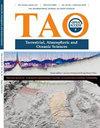2016年梅农地震地表形变及其对活动褶皱的指示意义
IF 1.6
4区 地球科学
Q4 GEOSCIENCES, MULTIDISCIPLINARY
引用次数: 0
摘要
摘要对2016年台湾关庙地区美浓地震诱发的同震地表裂缝的位置、趋势和位移向量进行了230次野外观测。同震地表裂缝趋势自北向东北。同震形变区向W-WNW方向移动。观庙镇地表裂缝主要分布在观庙向斜两侧。沿关庙向斜轴向迹也观察到震前形变。这些结果为台湾西南部的高构造活动提供了线索。认为关庙向斜是一个同震活动和震间蠕动并存的活动褶皱,由于其持续的损失,引起了不可忽视的微地质灾害。本文报道了一个位于关庙向斜和忠州背斜之间的正弯矩断裂——罗仙辽断裂。然而,浅层罗仙辽断裂与关庙余震的深层致病断裂之间的联系尚不清楚。我们论证了同震地表变形的运动过程,并认为弯矩断层可以为理解褶皱的重复周期提供机会。在台湾西南等地质条件相似的地区,研究高流体压力岩石的震源褶皱放大机制对地震危险性评估具有重要意义。本文章由计算机程序翻译,如有差异,请以英文原文为准。
Surface deformation induced by the 2016 Meinong earthquake and its implications to active folds
Abstract We present 230 field observations on the location, trending, and displacement vectors of the coseismic surface cracks induced by the 2016 Meinong earthquake in the Guanmiao area, SW Taiwan. Coseismic surface cracks trends from the north to northeast. The coseismic deformed region moved toward the W-WNW. In Guanmiao town, surface cracks were mainly distributed on both limbs of the Guanmiao syncline. The preseismic deformation was also observed along the axial trace of the Guanmiao syncline. These results give clues to high structural activities in SW Taiwan. We argue that Guanmiao syncline is an active fold with both coseismic activity and interseismic creeping, which induced nonnegligible micro-geohazards because of the continual loss. We report a new case of the normal bending-moment fault, the Luosianliao fault, which locates between the Guanmiao syncline and Chungchou anticline. However, the linkage between the shallow Luosianliao fault and the deep-seated causative fault of Guanmiao aftershocks are not known yet. We demonstrate the kinematic process of coseismic surface deformation and argue that the bending-moment fault could provide an opportunity to understand the recurrence interval of folding. The mechanism of earthquake-induced folding amplification through high fluid-pressure rocks may play a critical role in assessing earthquake hazard risks in regions with similar geology to SW Taiwan.
求助全文
通过发布文献求助,成功后即可免费获取论文全文。
去求助
来源期刊
CiteScore
2.00
自引率
0.00%
发文量
29
审稿时长
4.5 months
期刊介绍:
The major publication of the Chinese Geoscience Union (located in Taipei) since 1990, the journal of Terrestrial, Atmospheric and Oceanic Sciences (TAO) publishes bi-monthly scientific research articles, notes, correspondences and reviews in all disciplines of the Earth sciences. It is the amalgamation of the following journals:
Papers in Meteorological Research (published by the Meteorological Society of the ROC) since Vol. 12, No. 2
Bulletin of Geophysics (published by the Institute of Geophysics, National Central University) since No. 27
Acta Oceanographica Taiwanica (published by the Institute of Oceanography, National Taiwan University) since Vol. 42.

 求助内容:
求助内容: 应助结果提醒方式:
应助结果提醒方式:


